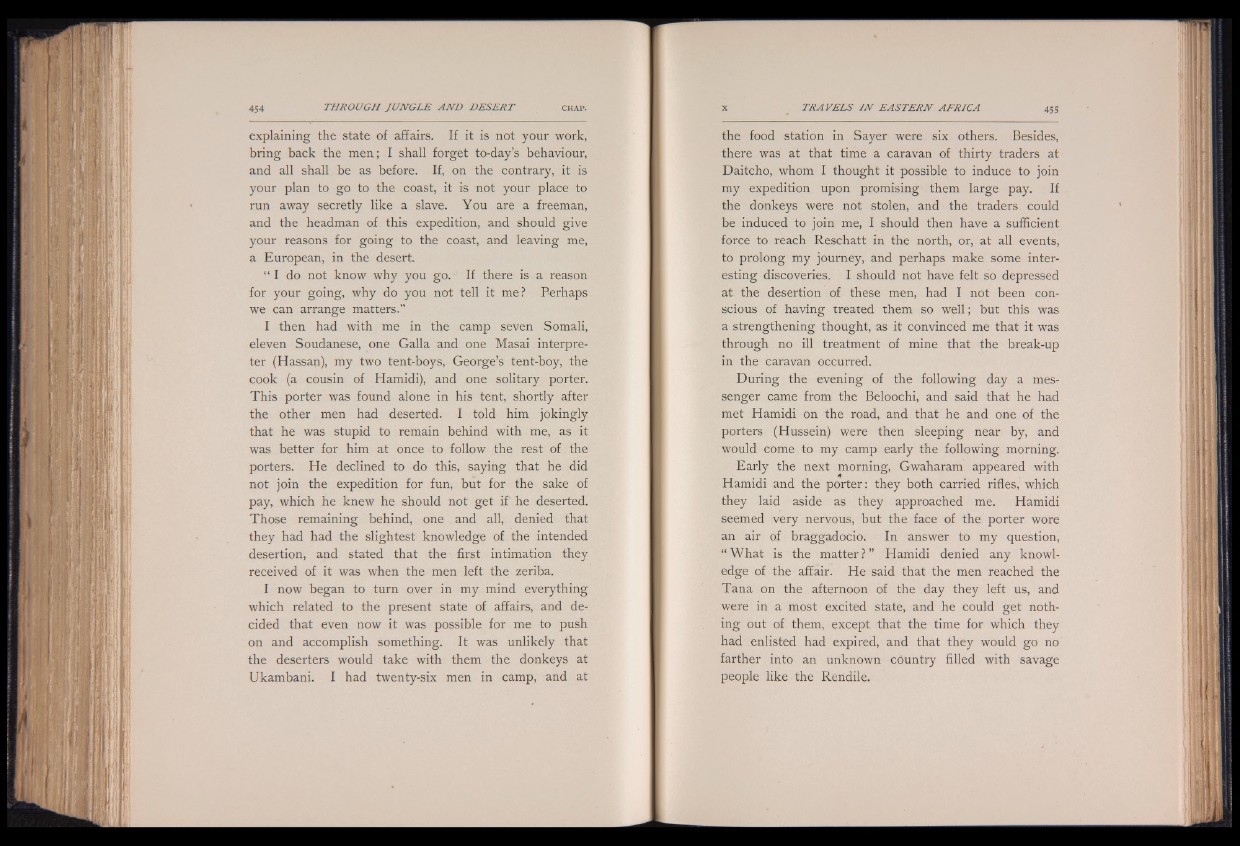
explaining the state of affairs. If it is not your work,
bring back the men; I shall forget to-day’s behaviour,
and all shall be as before. If, on the contrary, it is
your plan to go to the coast, it is not your place to
run away secretly like a slave. You are a freeman,
and the headman of this expedition, and should give
your reasons for going to the coast, and leaving me,
a European, in the desert.
“ I do not know why you go. If there is a reason
for your going, why do you not tell it me? Perhaps
we can arrange matters.”
I then had with me in the camp seven Somali,
eleven Soudanese, one Galla and one Masai interpreter
(Hassan), my two tent-boys, George’s tent-boy, the
cook (a cousin of Hamidi), and one solitary porter.
This porter was found alone in his tent, shortly after
the other men had deserted. I told him jokingly
that he was stupid to remain behind with me, as it
was better for him at once to follow the rest of the
porters. He declined to do this, saying that he did
not join the expedition for fun, but for the sake of
pay, which he knew he should not get if he deserted.
Those remaining behind, one and all, denied that
they had had the slightest knowledge of the intended
desertion, and stated that the first intimation they
received of it was when the men left the zeriba.
I now began to turn over in my mind everything
which related to the present state of affairs, and decided
that even now it was possible for me to push
on and accomplish something. It was unlikely that
the deserters would take with them the donkeys at
Ukambani. I had twenty-six men in camp, and at
the food station in Sayer were six others. Besides,
there was at that time a caravan of thirty traders at
Daitcho, whom I thought it possible to induce to join
my expedition upon promising them large pay. If
the donkeys were not stolen, and the traders could
be induced to join me, I should then have a sufficient
force to reach Reschatt in the north, or, at all events,
to prolong my journey, and perhaps make some interesting
discoveries. I should not have felt so depressed
at the desertion of these men, had I not been conscious
of having treated them so well; but this was
a strengthening thought, as it convinced me that it was
through no ill treatment of mine that the break-up
in the caravan occurred.
During the evening of the following day a messenger
came from the Beloochi, and said that he had
met Hamidi on the road, and that he and one of the
porters (Hussein) were then sleeping near by, and
would come to my camp early the following morning.
Early the next morning, Gwaharam appeared with
Hamidi and the porter: they both carried rifles, which
they laid aside as they approached me. Hamidi
seemed very nervous, but the face of the porter wore
an air of braggadocio. In answer to my question,
“ What is the matter ? ” Hamidi denied any knowledge
of the affair. He said that the men reached the
Tana on the afternoon of the day they left us, and
were in a most excited state, and he could get nothing
out of them, except that the time for which they
had enlisted had expired, and that they would go no
farther into an unknown country filled with savage
people like the Rendile.